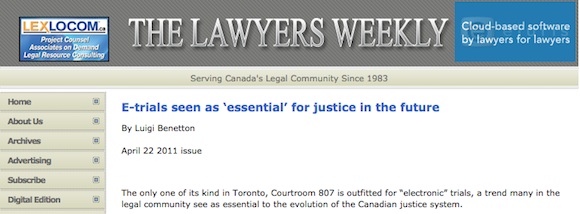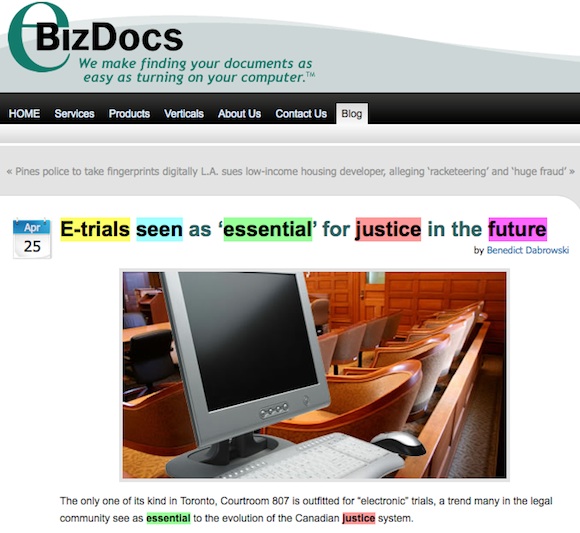A too-familiar story: one freelancer’s run-in with plagiarism
Imitation may be the sincerest form of flattery, but not when your work isn’t credited — or compensated. Earlier this month, freelance writer Luigi Benetton received a message from an editor who had come across one of his articles online. The only problem was that it was posted under someone else’s byline and it was on a site he’s never heard of, let alone heard from. The post matched, word for word and even the headline, an article Benetton had written for The Lawyers Weekly, a publication owned by LexisNexis.
The article was published on a site called eBizDocs.com, a site based out of Menands, New York, that calls itself “an award-winning electronic document management service provider that is committed to helping companies, state agencies, local governments and other organizations find electronic solutions to otherwise inefficient record management systems.” It was attributed to “Benedict Dabrowski,” who appears to be an employee of the company and quite possibly a real person. His byline appears on various articles on the site, including press releases about the company’s charitable initiatives.
Benetton notified the managing editor of The Lawyers Weekly, Tim Wilbur , who sought advice from in-house counsel at LexisNexis. Based on that advice, Wilbur wrote an email to the eBizDocs, demanding they take action, and threatening to get lawyers involved, if they didn’t. [Note to prospective plagiarizers: don’t steal work from an publication that has “lawyers” in its title and not expect to hear from some.] Less than an hour later, the article was gone from the site. Google’s caching function still picks it up, though (see screen capture).
Benetton says no one from eBizDocs contacted to explain what happened or to offer an apology. Despite the fact that his work was posted on the site for weeks, without his knowledge or permission, he did not plan on seeking compensation from the site and said he wouldn’t know how to go about it.
Are there really no consequences for plagiarizing other people’s work online?
We asked Wilbur, a lawyer himself, whether there would be any point in suing the eBizDocs site for damages, since it seems there’s a strong case to prove the site knowingly plagiarized Benetton’s work. Would the potential rewards not be worth the time and money required to undertake legal action? His response, simply: “No.” He says that, in this case, there is no point in taking legal action, as the damages would be far smaller than the cost of pursuing this course of action.”
We contacted Benedict Dabrowski by email to ask how his byline ended up on the story. He did not respond.
Has your work been plagiarized? How was the situation resolved? Do you know, or know of, anyone who has sued for damages and won? Please share your experiences in the comments below.






on May 28, 2011 at 5:40 pm
· Permalink
While legal action may be expensive, it might be worth sending an invoice for unauthorized use. I’ve done that on the few occasions when I’ve found my work used without my permission. For unauthorized use, I charge three times the normal rate for usage rights and usually offer to license the work for an extended period (so that the infringing publisher has a chance to get the value paid for, through authorized use). So far, I have always received a cheque in the mail, but have never had anyone take me up on the license offer. Even if they don’t send payment, the effort on my part was minimal. Nothing ventured, nothing gained.
on May 30, 2011 at 10:14 am
· Permalink
That’s an *excellent* approach. It also puts the offending party on notice that people do keep track of this sort of thing.
It’s worth Googling the headline, or a line or two, of your work from time to time. It can be useful in terms of finding out whether anyone is quoting your material – which may lead to more work! – or ripping you off.
on May 31, 2011 at 3:37 pm
· Permalink
Quick update: as suggested, I invoiced eBizDocs, giving them 10 days to pay and a PayPal payment option via Freshbooks.
Not sure what’ll happen, but as Darrell Noakes wisely wrote above: “Even if they don’t send payment, the effort on my part was minimal. Nothing ventured, nothing gained.”
BTW, Darrell, no plagiarism meant with the above quote 😉
on June 3, 2011 at 3:21 pm
· Permalink
Another update:
The day AFTER I sent the invoice, counsel for eBizDocs contacted the editor at the Lawyers Weekly to see about setting things right.
Today, they asked for (and the editor sent) the correction notice to be posted on the eBixDocs website.
They’re also trying to ascertain whether I have copyright, likely to figure out whether I’m within my rights to invoice eBizDocs. Stay tuned on that one.
on June 26, 2011 at 10:00 pm
· Permalink
Oh well… no reply and no money from eBizDocs.
I doubt this is worth pursuing, so I’ll chalk it up to a company not wanting to do the right thing and pay a relatively minimal (3-figure) invoice for several weeks of unauthorized use and a blatant act of plagiarism. And I’ll move on.
That said, I wonder if this blog post will live on and perhaps one day come back to dog eBizDocs…
In case you’re wondering, I don’t believe in exacting a pound of flesh – you can’t take a pound of flesh to the bank.
on July 12, 2011 at 10:05 am
· Permalink
Just ran across a neat article and thought I’d post it here:
How To Use Content From Other Blogs Without Violating Copyright
http://socialfresh.com/how-to-use-content-from-other-blogs-without-infringing-on-their-copyright/
Sure, this case deals with online content, but this article’s tenets apply just as well.
Here’s the bit that struck me:
“Lawsuits — The way you really need to think about copying the original work of another person is, will they sue you? If you are worried about the potential of a lawsuit, then you likely should not copy the content without direct permission. Even if you are in the right, but you piss off the wrong entity, you may still have to pay significant legal fees. Think about whether you have that freedom or not.”
I doubt the plagiarizer in this case was worried about a lawsuit… and to avoid problems, all the plagiarizer had to do was take down the plagiarized post… which is what happened.